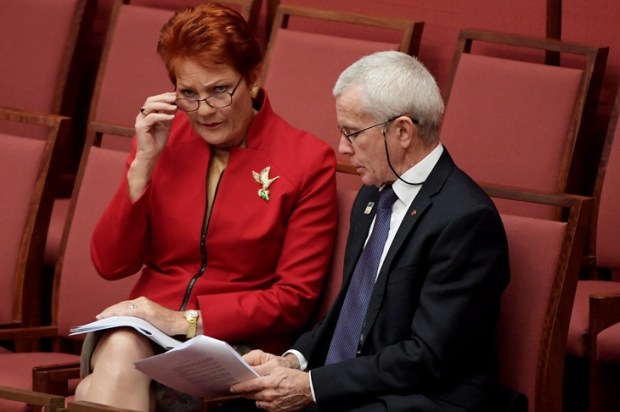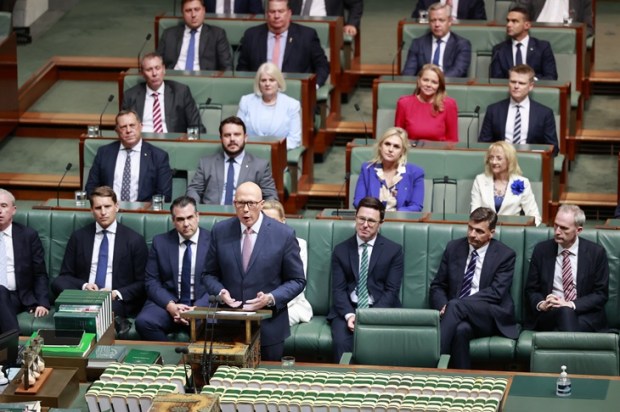We are a nation of delayed common sense. We often take too long to get there.
Both sides of politics now accept that economic development must be protected to improve our standard of living. The Albanese government protected the Tasmanian salmon fishing industry with the support of the Coalition. Much more is needed.
A more sensible Australia might have debated the way our Constitution serves the community. National company laws, rather than inconsistent state laws, were a good idea. This did not require Constitutional amendment, let alone the consistently unsuccessful amendments we have drafted and debated for 40 years.
A sensible Australia would provide a more effective immigration system that protects the rights of citizens against violent criminals or haters who will contribute nothing to our country and should be quickly deported. This is now a rough political consensus, here and in many other first-world countries. But how to do it?
We would quickly recognise the Janus-like quality of labour laws and other social protections, namely that they are both a cost and a protection for ordinary people, not one thing alone. The Roman god Janus looks in all directions simultaneously. This would have avoided some of our seesaw alterations in law.
Our economic debate would have stressed housing as more than a trading commodity.
Our NDIS would have recognised more the need to closely constrain entitlements. Such systems always decay from the humane into vice given human nature.
Our energy policy would have focused less on talking about ‘the future of the planet,’ which depends on others. But what about power prices?
Our trading system would have recognised the geopolitical problems of exposing industry to full competition in a dangerous world. We would have fewer toxic, damaging demonstrations about foreign hot-spots.
The admired reforms of 1983-98 turned our economy upside down. There were unjustifiable anti-competitive restrictions across industry and with labour relations. This ‘low hanging fruit’ was painfully removed or lessened. There are few similar labour restrictions in the new services sectors, such as aged and disability care, that have grown as the old manufacturing sectors contracted.
There is no point in fighting the Battle of Waterloo again in an age which has entirely changed.
However regulatory restrictions remain across the economy. Some are working badly and need reform.
The most mentioned means to improve productivity are taxation reform, mining approvals, Government waste, energy, and housing.
Common sense taxation change is held up by concern about who would lose. It must therefore be measured and careful through a proper filtering process, such as a national summit of representatives to go through and agree changes. Or a risky, uncertain election can be fought as in 1998.
Assessment of environment and Aboriginal heritage regarding mining applications is utterly dysfunctional. In Munkara v Santos the Federal Court found that expert evidence was ‘conduct far flung from proper scientific method and falls short of an expert’s obligation to this Court.’ $9 million in costs were awarded against the Environmental Defenders Office, which tried to block a valuable gas project.
Any reforms will need to be positive in nature and demonstrate an awareness of proportionality. They will need vigorous defence.
Finally, a more sensible country would not need reminding that our current vastly beneficial country for ordinary people had a beneficial history.
Everyone checking that entry in their bank account marked ‘wages’ should for example acknowledge the great moral debt they owe to the Squatters who built the economy.
The Squattocracy
Bringing down the Squattocracy was the aim of all good thinking city residents for over one hundred years, to democratise and reform electoral laws.
The social pretensions of the Squattocracy, a watered-down English model, would offend many. But not I suppose admirers of modern adaptations of Pride and Prejudice and the several billion multicultural viewers of the multicultural Bridgerton.
But the economic role of the Squatters and ruffian employees meant Australia ‘rode on the sheep’s back’ until the 1950s brought other industries to the fore.
Mining was also crucial. In 1845 the Burra copper mines began, one of the richest in the world. Shortly after the dusty dirt roads saw 800 bullock teams transporting copper to Port Adelaide.
An entrenched hostility to squatters lingered. A journalist wanted to do a profile for the local newspaper of the South Australian landowning families in the 1950s, while they were still there. He knew them all because he shared their background. The journalists on the newspaper stopped the project, for political reasons. This was a loss of memory.
The Selectors
There were also the Selectors, who selected land to farm under the 1860s land reform Acts forced through bitterly resisting Legislative Councils by democratic forces.
Steele Rudd wrote On Our Selection, a comic account of the life, loves, and misadventures of Dad and Dave, who were chronically useless and economically marginal.
The first crop of corn only barely covers the local shop bill, the sweetest potatoes were grown in a cemetery, they eat a stewed Kangaroo-rat and stay up all night to keep the kangaroos out of the corn.
The Deeds to the land arrive by mail one day! Except that is the day that their horse, Emelina, is eaten by crows. ‘Now Dad regularly curses the deeds every mail-day…’
The Ruffians
We were all, of course, ruffians, distinguished by a thin veneer of middle-class respectability, and usually being able to read and write.
The shepherds, labourers, shearers, and stockmen, some of whom were Aboriginal people, were the third force in the land, accompanied by the local shopkeepers and tradesmen, and professionals. You and I should thank them too for our wages or welfare.
Or instead, we could discontinue using their language, English, discontinue using roads they built, or hospitals, schools, and universities they painfully built with their charity and taxes.
Reg Hamilton, Adjunct Professor, School of Business and Law, Central Queensland University

























